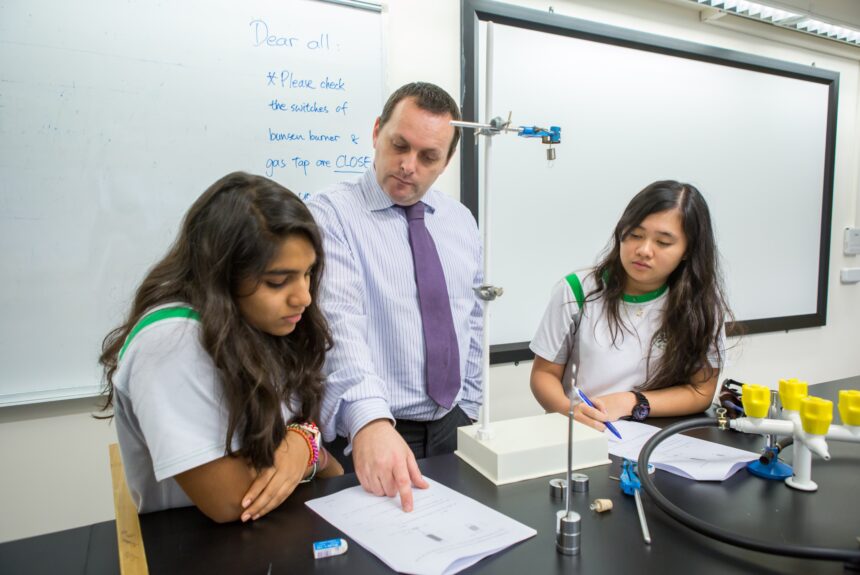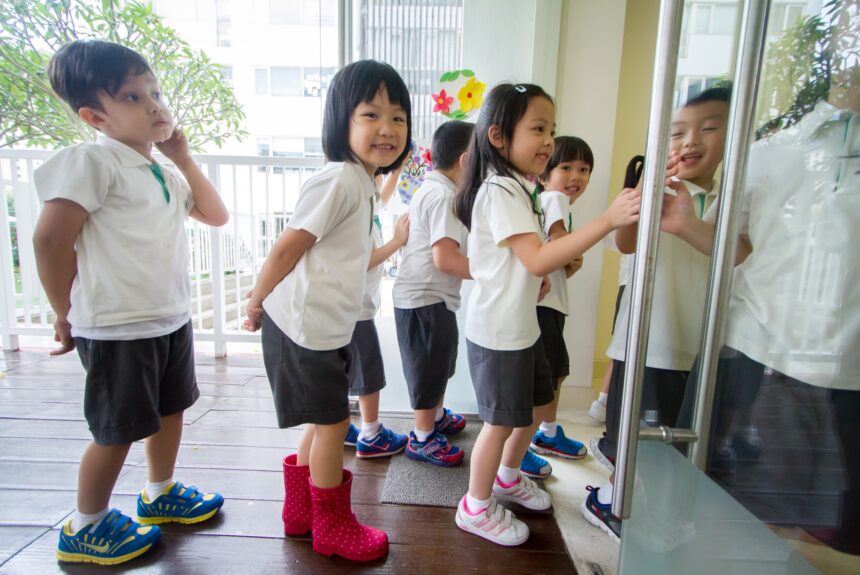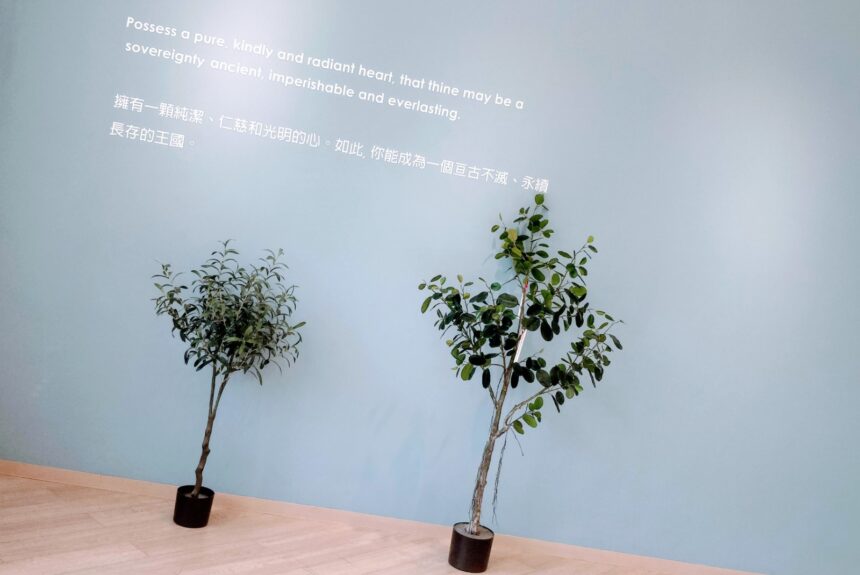“By becoming familiar with the School of the Nations conceptual framework, I aim to integrate these into my personal life as well…modeling it in my classroom by using specific examples. I hope students will also be able to expand and promote the conceptual framework outside of the school environment as well.”
Conceptual Framework
All institutions, including educational ones, are based on certain philosophies and convictions, whether they are made explicit or not.
At the School of the Nations, we are open and transparent about the source and nature of our beliefs, and invite those who are attracted to these principles to participate in exploring their application to the field of education.
The School of the Nations was founded in 1988 by a group of Macau residents who were inspired by the great importance that the teachings of Baha’u’llah place on the role of education in promoting social progress. A non-profit entity, the school has from the outset been focused on serving the needs of the community by providing quality education.
Articulating a Framework

From its early years, the school elaborated a conceptual framework that explains the beliefs, principles, values, methods and approaches that guide its efforts. This framework has served to inform its vision and help chart its course over the years.
One element of this framework is comprised of fundamental beliefs, such as those related to the oneness of humanity, the evolution of society, the purpose of education and the nature of the human being. Another element relates to the values the school strives to uphold, as expressed, for example, in its emphasis on cooperation and selfless service to humanity. Methods and approaches oriented towards fostering a systematic process of individual and collective learning constitute another element of our framework.
Making the elements of our framework explicit, and regularly revisiting them, enables us to strive towards increasing consistency between aspirations and actions, belief and practice. At the same time, we hope it encourages the participation of like-minded families and collaborators who agree on these fundamental elements.
The school’s perspective on education can be understood within the wider context of its conviction that all people belong to one human family and that humanity is gradually evolving towards a stage in which its oneness will be fully recognized and embraced. The world of humanity can be compared to the human body. Just as cooperation, reciprocity and unity in diversity are principles that govern a healthy body’s functioning, so must it be with humanity as a whole.
Education, then, must be understood within the wider context of the changes happening in society. We see the current stage in human history as part of an evolutionary journey that can best be described as a collective passage from childhood to maturity. The present stage is one of transition, in which the ways of childhood must be abandoned, and new virtues, powers and capacities befitting a condition of maturity must be developed. In this light, the school aims to assist students to develop the knowledge, qualities, attitudes and skills needed to make a constructive contribution to the emergence of a peaceful, just and united society.
The school sees the aim of education as twofold: to help students develop the vast potentialities latent within them and to dedicate themselves to the promotion of the welfare of the whole human race.
The school aims to prepare students to see themselves as responsible for changing the world for the better. Both aspects of this sense of purpose—to transform oneself and to contribute to the transformation of society—are inseparable. Individuals shape their environment and are in turn molded by the world around them. Social progress, then, requires that individuals be capable of making changes within themselves and contributing to changes in the structure of society.
In order not to be misdirected by the negative influences that are so prevalent in today’s world, students’ sense of purpose must be shaped by appropriate forces—such as an attraction to true beauty and a thirst for knowledge.
The school places the highest value on selfless service to humanity. Only in service to others is the dual purpose of education fully realized. Service to others stimulates personal growth, and as students grow, they are able to serve the needs of others more effectively.
Students at the school may find opportunities for service initially within the context of family and school life, and gradually engage in more complex action to address the needs of their community.
At a time when the world is confronted with unprecedented global challenges and opportunities, building capacity for service is an essential task of education.
Each person has both a higher (spiritual) nature and lower (animal) nature.
The lower nature, which is shared with the animal kingdom, is the result of the process of physical evolution marked by the struggle for survival. If left unchecked, it leads to cruelty, oppression and egotism.
A person’s higher nature is characterized by such qualities as truthfulness, kindness, justice, mercy, generosity, and humility. Educational processes can help students to develop these qualities so that their higher nature can dominate.
An individual’s potential is nurtured through a process of intellectual and spiritual development. Each person must be given the opportunity to develop according to his or her capacity and to strive for excellence in virtue as well as the sciences, arts, languages and humanities.
Indeed these two aspects of development are interrelated. The qualities of truthfulness and humility, for example, are essential for progress in the sciences, and a scientific approach, in turn, is critical to personal growth and effective service to humanity. The harmonious development of students’ intellectual and spiritual faculties ensures that their powers are fully developed and used for purposes that benefit, rather than harm, humanity.
To continuously progress and align more closely with its conceptual framework, the School has adopted learning as a mode of operation. This approach involves the study of educational theory and practice, as well as the Baha’i writings, and the application of insights gleaned through study to educational activities. Action is interspersed with constant reflection to articulate lessons learned and refine practice.
We regularly examine how we maintain such a mode of learning in action. We aim to ensue growing numbers participate in the generation and application of relevant knowledge and to devise structures that support the systematization of our experience and the sharing of lessons learned.
One may notice morning devotions and suspension of school during Baha’i Holy days, along with thoughtful educational programmes.
Every morning, the classes in the School begin with several prayers and writings aimed at uplifting the heart and spirit—allowing time for personal reflection and preparation for the day ahead. All devotionals respect and aim to inspire those of all religious traditions, and those without. At the Kindergarten level, children learn short prayers. At the Primary and Secondary levels, devotionals include writings from a wide range of religious texts and students are also encouraged to bring and share prayers and writings that they find inspiring.
There are nine significant dates in a year associated with the history of the Baha’i Faith, when work and school are suspended. These are connected to the lives of Baha’u’llah and the Bab. The school sees the commemoration of holy days as an opportunity to reflect on the world’s spiritual heritage and how it is inspiring the efforts of many across the globe to serve humanity. The significance of these holy days is often explained to students and celebrations or commemorative gatherings are often organized.
Another significant way in which the school’s Baha’i inspiration finds expression is through its implementation of innovative educational programmes, which draw on principles and concepts from the Baha’i teachings. The overall aim of these programmes, which students participate in during weekly character development class periods, is to foster the development their spiritual qualities and their capacity for service to society.
Though the guiding philosophy of School of the Nations draws its inspiration from the Baha’i teachings, it does not limit itself to this system of knowledge and practice alone. The School draws on insights from theory and practice from a wide range of sources, including the rich educational heritage of China and international best practices.
The School was founded in a spirit of loving service to humanity, with the aim of promoting the well-being of students of all beliefs or backgrounds. It was not created for the purpose of converting others to become believers of the Baha’i Faith. Indeed, proselytising—offering benefits or exerting pressure to induce people to adopt a religion—is explicitly prohibited in the teachings of the Baha’i Faith.
As described in this and other sections of this website, the school derives inspiration from Baha’i teachings and principles in its work. It is hoped that these teachings would assist students to gain a yearning to serve humanity, become builders of justice and peace in the world, manifest a virtuous character, and become contributors to the advancement of society. Importantly, it has been found that this aspect of the school’s identity and approach can assist students to resist and find alternatives to aggressive materialistic values and forces that are prevalent in many spheres of today’s world.
Information about the Baha’i Faith in English and Chinese can be found on the official Baha’i website. The local Baha’i community offers activities for children, youth, and adults of all backgrounds in neighbourhoods across Macau. To learn more about these activities or the Faith itself, you may contact the Spiritual Assembly of the Baha’is of Macau.



